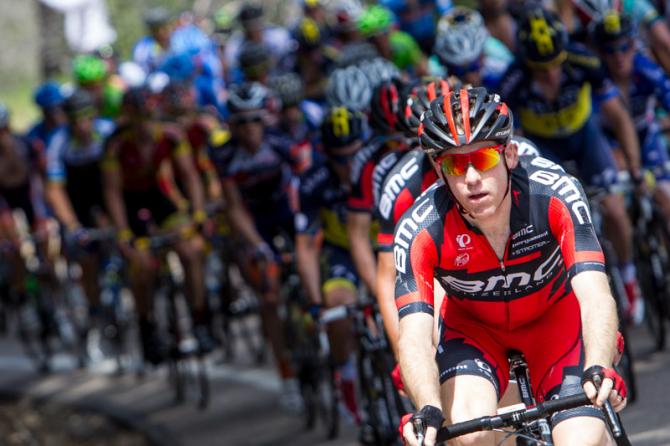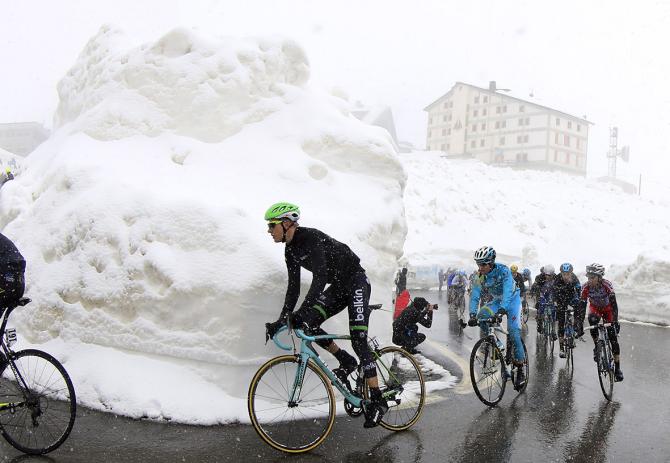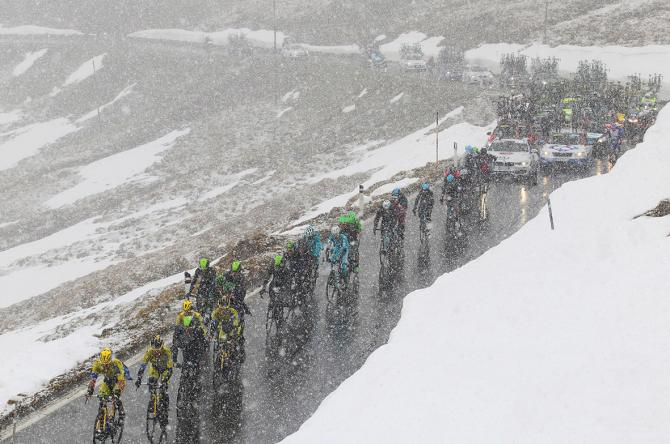Bookwalter backs the creation of North American riders' association
ANAPRC wants to be pro-active in dealings with UCI, teams and races



BMC rider Brent Bookwalter says the newly created ANAPRC (Association of North American Professional Road Cyclists) wants to be pro-active rather than confrontational in the way it interacts with the UCI, teams and race organisers, as it tries defend the interests of the riders in the peloton. One of ANAPRC's first goals is to help with the introduction of an Extreme Weather Protocol, where clear rules decide if and how races should be held in extreme heat or cold.
On Tuesday the ANAPRC announced that former Garmin rider Christian Vande Velde has been chosen as a temporary president, with other current riders, including Bookwalter, Ted King (Cannondale-Garmin), Tejay van Garderen (BMC), Matthew Busche (Trek Factory Racing) and Peter Stetina (BMC) as Directors. They volunteered for the roles, with full elections to be held in early 2015. ANAPRC said it is actively seeking candidates to serve as the long-term Executive Director of the organization.
ANAPRC has become the eighth national riders' association under the umbrella of the CPA (Cyclistes Professionels Associés), the global riders' association headed by Gianni Bugno.
“As anyone who follows the sport knows, there's a lot of debate and controversy about how different interests are handled. A group of us Americans thought it was time to step up and be more pro-active in our role and how we interact with the teams and the races. Hopefully in the end its better for everyone involved,” Bookwalter told Cyclingnews at the Dubai Tour.
“We're not trying to combative or confrontational in any way, we just want to be collaborative. The key here word is pro-active. Whether that's creating a safer race and safer peloton, establishing better compensation and benefits for riders, or communicating better with the teams in the races. All those things are important.”
Establish an Extreme Weather Protocol to avoid a repeat of the Passo dello Stelvio confusion
Bookwalter rode the 2014 Giro d'Italia and so experienced first hand the chaos and health risks of racing in extreme cold condition at high altitude on the Passo dello Stelvio. An impromptu decision by the race director Mauro Vegni to informally neutralize the race near the summit to protect the riders only caused further confusion, with eventual race winner Nairo Quintana going away on the descent and gaining time on all his rivals.
Get The Leadout Newsletter
The latest race content, interviews, features, reviews and expert buying guides, direct to your inbox!
The ANAPRC hopes that an Extreme Weather Protocol would help avoid similar embarrassing scenes and protect the riders.
Cyclingnews understands that other rider representatives are also working on a similar protocol and that certain race organisers are ready to put an informal protocol in place this season without waiting for a formal rule change by the UCI.
“For me a big driving force for wanting to be involved is to avoid another Stelvio stage. I don't want the sport or the riders to go through something like that ever again,” Bookwalter told Cyclingnews.
“We have a few priorities that we'd like to achieve eventually and one of these is establishing an Extreme Weather Protocol and getting that accepted by the UCI, the races and the teams. It's so that when a situation like the bad weather on the Stelvio happens, a protocol is followed that makes thing safe and clear for everybody. Right now the decision on if we race is purely discretionary. It's decided on the road, in the race, by someone making a call. We're all at fault sometimes and nobody is perfect. It's a very difficult decision to make. We think there needs to be a set protocol of how the decision is made and how it's communicated to the teams a riders and sponsors.”
Collaborative, not confrontational
Bookwalter admitted the riders did not know how the UCI, race organisers and their teams and employers will react to the creation of the association.
Riders in the peloton have rarely shown signs of unity, with protests and strikes about road conditions and safety almost always failing at the first whiff of pressure from the race organisers and teams. This is due to the riders being rivals on the road, due to different nationalities and due to pressure and threats from teams and sponsors. As a consequence the riders have very little collective bargaining power or voice on key issues that often affect them directly.
“What was revealed on Tuesday was the first public announcement,” Bookwalter explained.
“We're not sure how the teams, the races and the UCI will receive us but the people we've talked to individually, are supportive and that's good to hear. Our aim is to collaborative, not be confrontational or take over anything. I think we've done a good job getting the ball rolling. It's difficult, we're spread out all over the world but a lot of guys have invested time and effort to be on the same page and establish something to build upon.”
“We're not a union, the CPA exists in that role, we just want to have a voice. But we decided that that the best way to influence things is to have a seat on the CPA and influence their thinking so they can influence the other stakeholders such as the race organisers and the UCI.”

Stephen is one of the most experienced member of the Cyclingnews team, having reported on professional cycling since 1994. He has been Head of News at Cyclingnews since 2022, before which he held the position of European editor since 2012 and previously worked for Reuters, Shift Active Media, and CyclingWeekly, among other publications.